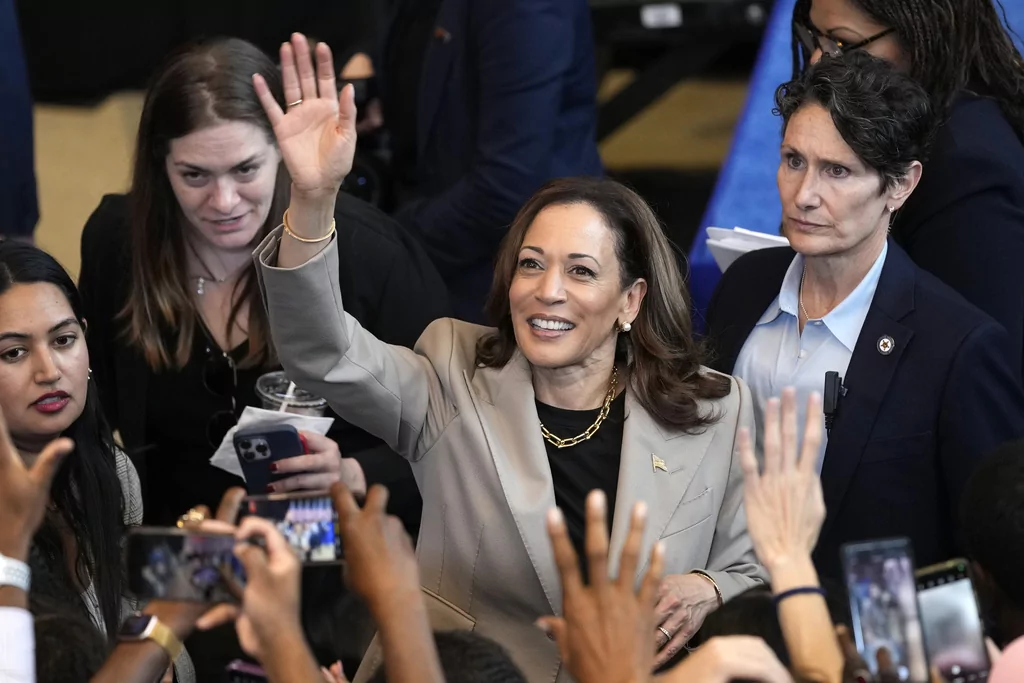

Vice President Kamala Harris will try Friday to shift blame for inflation from a federal government headed by her and President Joe Biden to a greedy private sector.
The push against price-gouging not only allows Harris to distance herself from Bidenomics and one of the least popular aspects of the Biden-Harris administration, but it allows her to reframe the whole issue as one of corporate avarice, and therefore solvable through liberal policies, rather than fiscal or monetary irresponsibility.
Harris’s move comes amid signs inflation is finally cooling, after reaching a 41-year high during her vice presidency, auguring a possible interest rate cut by the Federal Reserve before the election.
But Harris and other Democrats realize the high cost of living compared to when former President Donald Trump was in office is a major liability this election year.
Trump appeared Thursday at his property in New Jersey alongside basic grocery store items that have risen in price under Biden and Harris, in a preemptive strike against her economic remarks.
Noting Harris’s pledge to address high prices during her first day in office, Trump said, “Day one for Kamala was 3 1/2 years ago. Where has she been?”
Sen. J.D. Vance (R-OH), Trump’s running mate, struck a similar tone on Wednesday. “I was listening to Kamala Harris give a rally recently where she said she’s going to ‘tackle the affordability crisis’ on day one,” he said in the battleground state of Michigan. “Kamala, ‘day one’ was January of 2021 — ‘day one’ was four years ago!”
“Because of your policies,” Vance continued, “too many children can’t afford a nice meal.”
In some ways, this has been an ongoing debate. Biden has argued that there are various things the federal government can do, from subsidizing expensive necessities to curbing price hikes by big businesses, to alleviate the cost of living. Republicans have blamed high federal spending itself, particularly the American Rescue Plan, which poured additional trillions of dollars into an economy that was already reopening from the pandemic, for which Harris cast the tiebreaking vote in the Senate.
Econ 101 teaches that inflation is the product of too many dollars chasing too few goods, forcing the Fed to tighten the money supply to address the problem.
But Biden’s team has wanted to place the blame on greedy companies shrinking bags of cookies or chips and otherwise charging outrageous prices, something harder to blame on Democrats and which lends itself better to liberal policy solutions.
Inflation in the 1970s and early 1980s brought to an end the expansion of the welfare state that took place from the New Deal in the 1930s to the Great Society in the 1960s. It also rang down the curtain on what had been mostly one-party Democratic rule at the presidential and congressional levels.
Federal spending was elevated and inflationary under Trump as well, complicating easy partisan narratives. But most of that spending took place at a time when businesses were shut down due to restrictions put in place largely by cities and states yet encouraged by the federal government. Those closures had largely ended by the time of Biden’s last wave of high spending.
Nevertheless, polls have shown that voters do not hold Harris as responsible for inflation as Biden. Muddying the waters about why prices are so high is a way to reclaim an issue that once looked likely to eject Democrats from the White House.
“She will lay out an approach relatively light on details,” the New York Times reported ahead of Harris’s speech in North Carolina. “It will shift emphasis from Mr. Biden’s focus on job creation and made-in-America manufacturing, and toward efforts to rein in the cost of living. But it will rarely break from Mr. Biden on substance.”
What Harris hopes to do is break with the unpopularity of the administration she has served, necessitating that she replace Biden at the top of the Democratic ticket.
“She wants to break with Biden on issues on which he’s unpopular. First up: rising prices,” Axios reported. “This is part of a highly choreographed effort to define herself — in some cases, redefine herself — as a different kind of Democrat.”
CLICK HERE TO READ MORE FROM THE WASHINGTON EXAMINER
Except these are all fairly standard Democratic talking points, emphasizing shrunken portion size over bigger government.
Narrowing the gap with Trump is in any event crucial to Harris’s chances in November. Friday in Raleigh will be the beginning of her attempts to accomplish just that.




